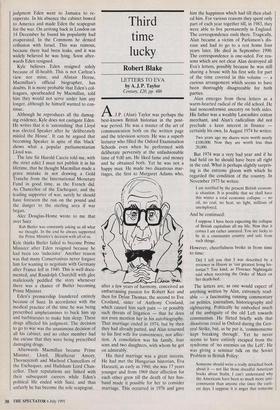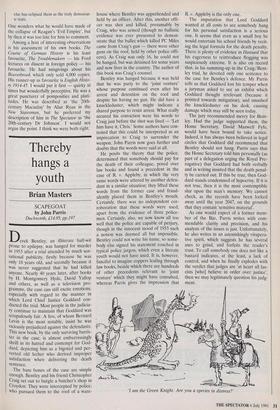Third time lucky
Robert Blake
LETTERS TO EVA by A. J. P. Taylor Century, £20, pp. 486
A.J.P. (Alan) Taylor was perhaps the best-known British historian in the post- war period. He was a master of the art of communication both on the written page and the television screen. He was a superb lecturer who filled the Oxford Examination Schools even when he performed with deliberate perversity at the unfashionable time of 9.00 am. He liked fame and money and he obtained both. Yet he was not a happy man. He made two disastrous mar- riages, the first to Margaret Adams who, CAPteA 6fra-e- after a few years of harmony, conceived an embarrassing passion for Robert Kee and then for Dylan Thomas; the second to Eve Crosland, sister of Anthony Crosland, which caused him such pain — or possibly such threats of litigation — that he does not even mention her in his autobiography. That marriage ended in 1974, but by then they had already parted, and Alan returned to his first wife for convenience, not affec- tion. A consolation was his family, four sons and two daughters, with whom he got on admirably.
His third marriage was a great success. He had met the Hungarian historian, Eva Haraszti, as early as 1960; she was 17 years younger and from 1969 their affection for each other grew till the death of her hus- band made it possible for her to consider marriage. This occurred in 1976 and gave him the happiness which had till then elud- ed him. For various reasons they spent only part of each year together till, in 1983, they were able to live permanently in England. The correspondence ends there. Tragically, Alan became a victim of Parkinson's dis- ease and had to go to a rest home four years later. He died in September 1990. The correspondence is one-sided. For rea- sons which are not clear Alan destroyed all Eva's letters, possibly because he was still sharing a house with his first wife for part of the time covered in this volume — a curious arrangement which seems to have been thoroughly disagreeable for both parties.
Alan emerges from these letters as a warm-hearted radical of the old school. He had nonconformist ancestry on both sides. His father was a wealthy Lancashire cotton merchant, and Alan's radicalism did not preclude a keen interest in finance certainly his own. In August 1974 he writes:
Two years ago my shares were worth nearly • £100,000. Now they are worth less than 20,000.
But 1974 was a very bad year and if he had held on he should have been all right in the end. What is perhaps slightly surpris- ing is the extreme gloom with which he regarded the condition of the country. In November 1973 he writes: I am terrified by the present British econom- ic situation. It is possible that we shall have this winter a total economic collapse — no oil, no coal, no heat, no light, millions of unemployed.
And he continued:
I suppose I have been expecting the collapse of British capitalism all my life. Now that it comes I am rather annoyed. You are lucky to be in a communist country and safe from such things.
However, cheerfulness broke in from time to time:
Did I tell you that I was described by a reviewer in History as `our greatest living his- torian'?. Too kind, as Florence Nightingale said when receiving the Order of Merit on her death-bed.
The letters are, as one would expect of anything written by Alan, extremely read- able — a fascinating running commentary on politics, journalism, historiography and sightseeing. Politically he embodied much of the ambiguity of the old Left towards communism. He flirted briefly with that disastrous creed in Oxford during the Gen- eral Strike, but, as he put it, 'commonsense kept breaking through'. Yet he never seems to have entirely escaped from the syndrome of 'no enemies on the Left'. He was giving a seminar talk on the Soviet Problem in British Policy:
Someone should write a really detached book about it — not like those dreadful American books about Stalin. I can't understand why the Americans have been so much more anti- communist than anyone else since the earli- est days. I suppose it is anger that someone else has eclipsed them as the truly democrat- ic state.
One wonders what he would have made of the collapse of Reagan's 'Evil Empire', but by then it was too late for him to comment.
Among a host of interesting observations is his assessment of his own books. The Course of German History is his least favourite, The Troublemakers — his Ford lectures on dissent in foreign policy — his favourite. He had misgivings about his Beaperbrook which only sold 4,000 copies. His runner-up as favourite is English Histo- ry 1914-45. I would put it first — quirky at times but wonderfully perceptive. He was a great puncturer of pomposities and plati- tudes. He was described as 'the 20th- century Macaulay' by Alan Ryan in the New Statesman, but he preferred my description of him in The Spectator as 'the 20th-century Dr Johnson'. I would not argue the point. I think we were both right.



















































 Previous page
Previous page